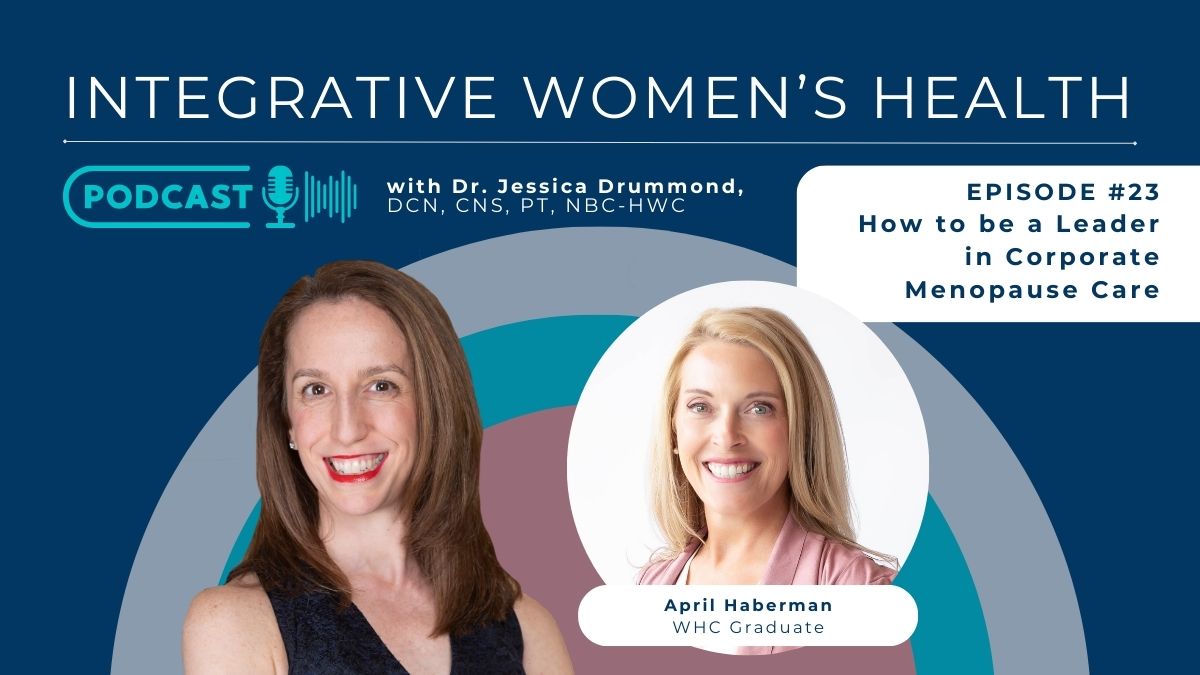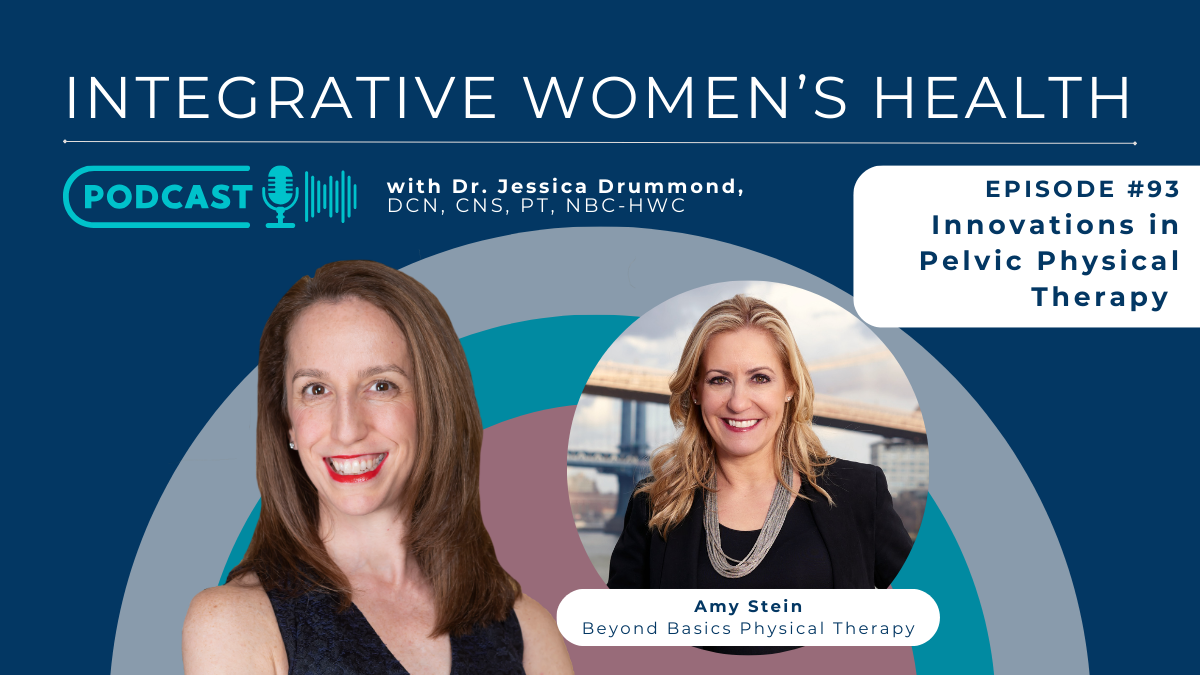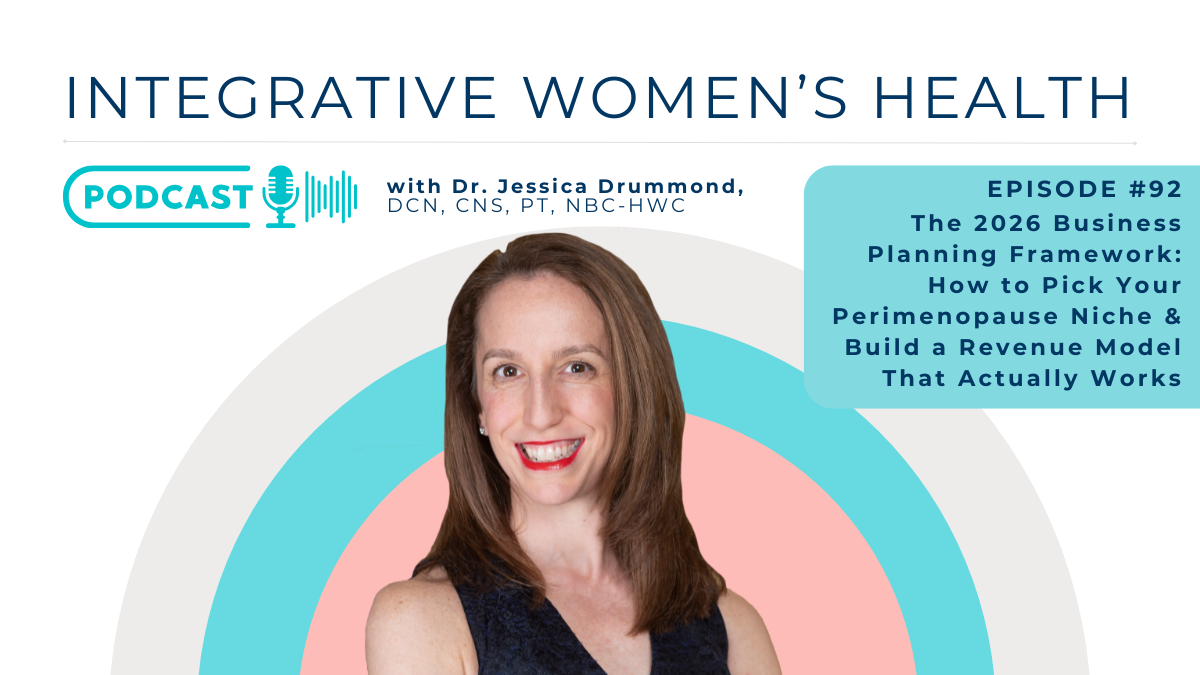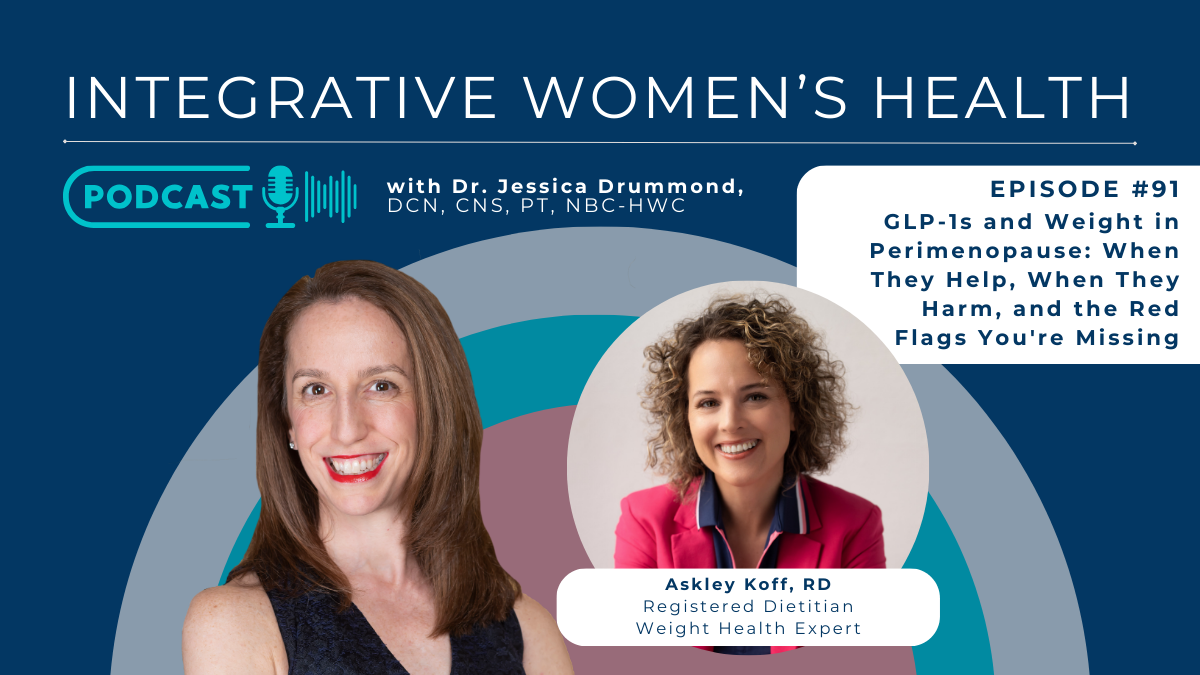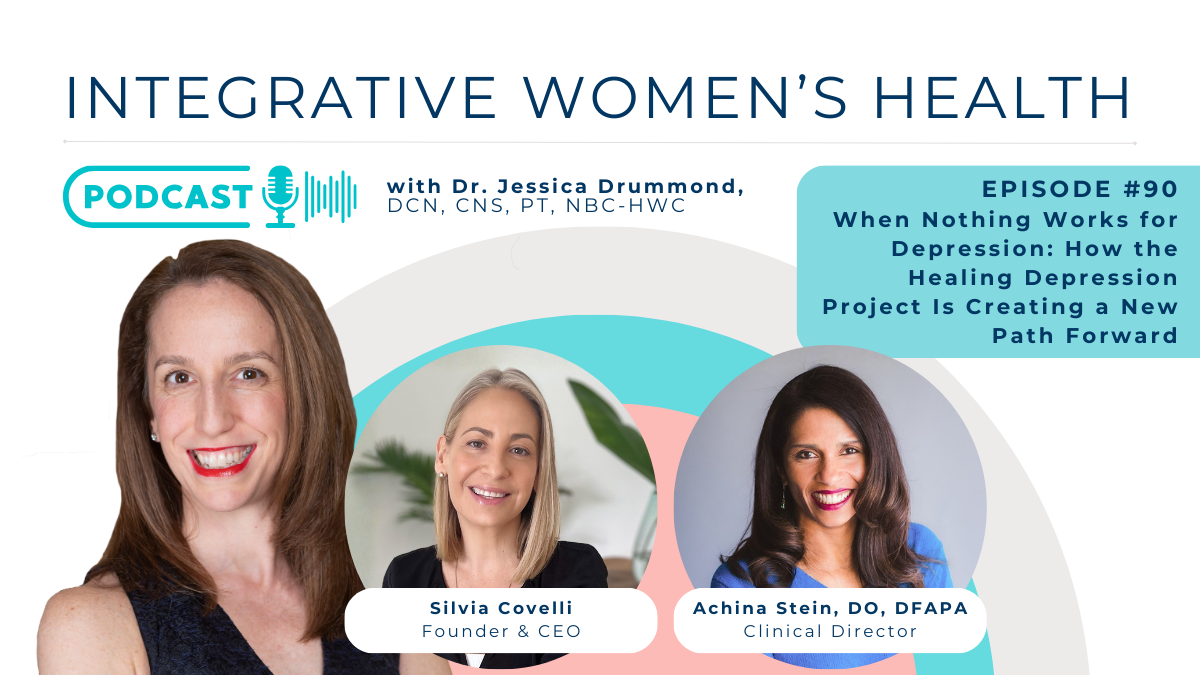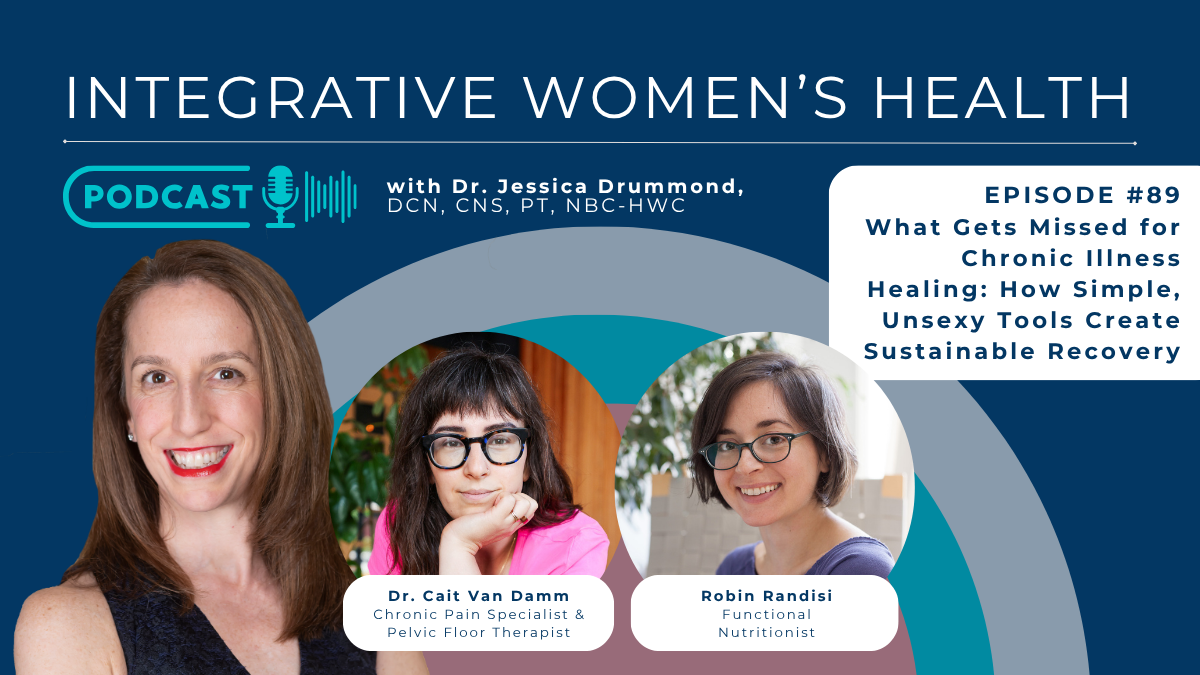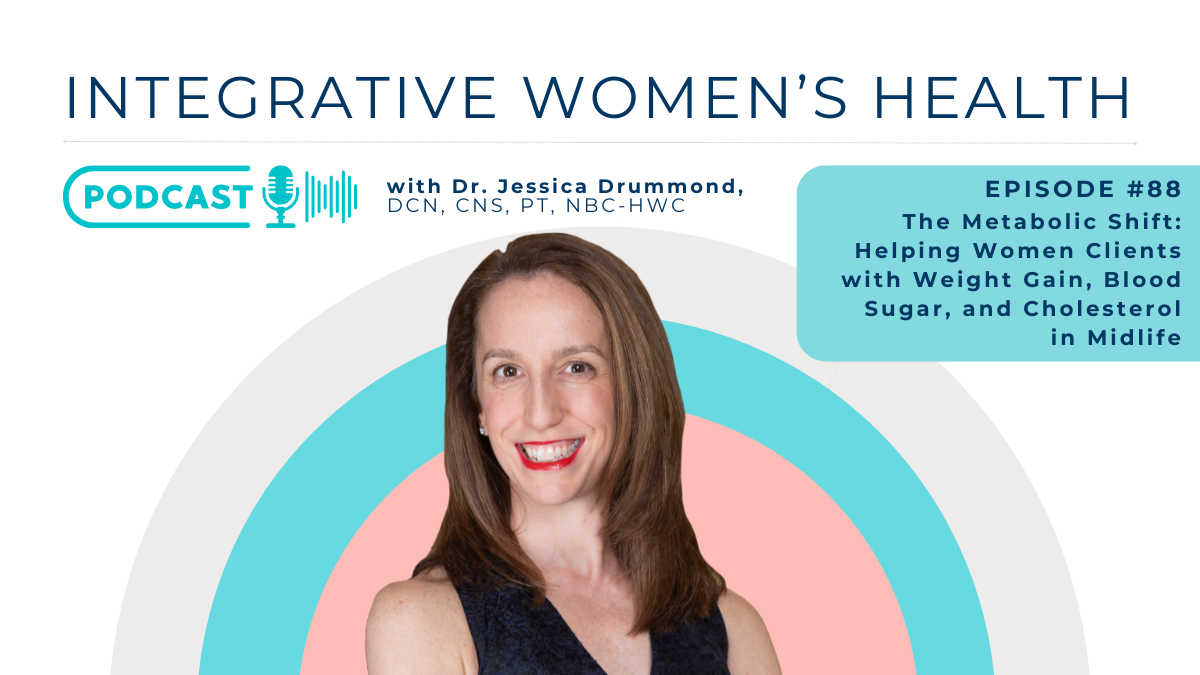Follow Us for Free:
About the episode
“Once I started the program and began practicing and learning, it’s hard to describe the freedom and excitement that it brought.” – April Haberman
Are you wondering about the next step in your career? If you love supporting women and are passionate about women’s health, healing, and helping women lead meaningful lives, women’s health coaching might be for you.
Today, I’m excited to be joined by April Haberman, a recent Women’s Health Coach certification program graduate who has become a leader in corporate menopause care. After a long career in the non-profit and development space, April wasn’t sure what she wanted to do next. She had a blank slate vision before her but wasn’t sure what a midlife transition would mean for her career. By using all the resources available to her in the Integrative Women’s Health Institute, April has made a dramatic and meaningful change, helping women navigate the kinds of changes that she navigated in the corporate world.
In this conversation, April and I discuss her decision to become a health coach, her focus on menopause, the experiences that influenced her desire to support women, how community helped her through her midlife career transition, the importance of self-care and a client-centered approach in health coaching, and more.
Enjoy the episode, and let’s innovate and integrate together!
About April Haberman
April Haberman boasts over a decade of dedicated service within the realm of global women’s health. Her professional journey is marked by a multifaceted expertise spanning business development, administrative aptitude, public speaking, training and development acumen, adept fundraising skills, and a clear understanding of healthcare intricacies. She has worked alongside organizations such as the Bill & Melinda Gates Foundation, Starbucks, Expedia, P&G and Goldman Sachs. In addition, April is a member of the Women’s Global Health Seattle Advisory Panel and holds a Women’s Health Coaching certification from the highly regarded Integrative Women’s Health Institute.
Her unique blend of corporate partnership expertise, training & curriculum development and an unwavering dedication to global women’s health has propelled her into her current role as CEO & Co-Founder at MiDOViA, where she empowers women in mid-life to flourish through education and support, both in and outside the workplace. April specializes in guiding individuals through the complex terrain of menstrual health, menopause transitions, and sexual reproductive wellness and comes alongside organizations to create inclusive and supportive environments for all.
Notably, April’s unwavering commitment to community betterment earned her the 2015 Young Mother of the Year Award for Washington State, and she has been honored with the Ruby Award by Soroptimist International for her exceptional contributions.
With a compassionate spirit, April has embarked on numerous journeys to Nicaragua and Eswatini, Africa, where she spearheaded women’s health training initiatives and established local enterprises, empowering women with income-generating opportunities.
Highlights
- April’s inspiration for transitioning into a career in health coaching
- Initial fears and hesitations about making the transition
- April’s decision to fully commit to the health coaching program and the freedom and excitement it brought
- April’s evolving vision for her health coaching career
- The day-to-day of April’s work in corporate menopause coaching
- Common questions from organizations around the necessity of menopause discussions in the workplace
- How education improves workplace dynamics
- The need for nuanced and balanced conversations around hormone therapy
- April’s message for people considering becoming health coaches
- Giving yourself the space to assess and evaluate your vision for yourself
Connect with April Haberman & MiDOViA
Mentioned in this episode
- What is the next step in your career? Start here: https://integrativewomenshealthinstitute.com/start-here/
Ready to revolutionize your career and grow your practice?
- Integrative Women’s Health Institute on Instagram | @integrativewomenshealth
- Integrative Women’s Health Institute on YouTube
Learn more about The Integrative Women’s Health Institute’s Programs.
- The Women’s Health Coach Certification Program
- Perimenopause and Menopause Certificate Program
- Advanced Menopausal Health Certificate Program
- Functional Nutrition Certificate Program
- Women’s Health in Business Certificate Program
- Endometriosis Certificate Program
Click here for a full transcript of the episode.
Dr. Jessica Drummond 00:00:03 Hi and welcome to the Integrative Women’s Health Podcast. I’m your host, Doctor Jessica Drummond, and I am so thrilled to have you here as we dive into today’s episode. As always, innovating and integrating in the world of women’s health. And just as a reminder, the content in this podcast episode is no substitute for medical advice, diagnosis, or treatment from your medical or licensed health care team. While myself and many of my guests are licensed healthcare professionals, we are not your licensed healthcare professionals, so you want to get advice on your unique circumstances. Diagnostic recommendations treatment recommendations from your home medical team. Enjoy the episode. Let’s innovate and integrate together. Hi and welcome to the Integrative Women’s Health Podcast. I’m your host, Doctor Jessica Drummond, founder and CEO of the Integrative Women’s Health Institute. Today I have a great guest for you. This episode is for you if you’re interested in what is the next step in my career? I love supporting women. I’m interested in women’s health. I’m passionate about women’s health and women’s healing and women’s ultimate happy, healthy, passionate and compassionate and meaningful lives.
Dr. Jessica Drummond 00:01:37 This episode is for you. You are going to meet April Haberman. She is a recent graduate of the Women’s Health Coach Certification Program, and she came to the program not quite sure what her next step was going to be in her career shift. She was transitioning in her own life, and she had this blank slate vision in front of her, but But using her master coach and our career coach team and all of the resources of the community of the Integrative Women’s Health Institute, including her peers in the program and weekly calls with me over the last year has made a dramatic and really meaningful transition, working now in the realm of menopause and perimenopausal health, especially in the workplace, and also for women directly themselves who are navigating the kinds of changes that she navigated. So let me introduce you to April. April boasts over a decade of dedicated service within the realm of global women’s health, so she was always passionate about women’s health. Now she’s bringing in the women’s health coaching piece and using her educator hat to work with and educate senior management and human resources professionals in corporations globally.
Dr. Jessica Drummond 00:03:08 Her professional journey is marked by a multifaceted experience spanning business development, administrative aptitude, public speaking, training and development acumen, adept fundraising skills, and a clear understanding of healthcare intricacies. She’s worked alongside organisations such as the Bill and Melinda Gates Foundation, Starbucks, Expedia, Procter and Gamble, and Goldman Sachs. In addition, April is a member of the Women’s Global Health Seattle Advisory Panel and holds a Women’s Health Coach certification from the highly regarded Integrative Women’s Health Institute. Yes. Thank you. She is a brilliant graduate of ours. Her unique blend of corporate partnership expertise, training and curriculum development, and an unwavering dedication to global women’s health has propelled her to her current role as CEO and co-founder of Moldova, where she empowers women in midlife to flourish through education and support both inside of and outside of the workplace. And you’re going to hear all about exactly how she does that. April specializes in guiding individuals through the complex terrain of menstrual health, menopause transitions, and sexual reproductive wellness, and comes alongside organizations to create inclusive and wildly supportive environments for women and women.
Dr. Jessica Drummond 00:04:31 Do need this within the workplace, as they’re transitioning through any big transitions that impact their physical and emotional health. So think about that. How could this be potentially a career opportunity for you? Notably, April’s unwavering commitment to community betterment earned her the 2015 Young Mother of the Year Award for the State of Washington, and she’s been honored with the Ruby Award by Soroptimist International for her exceptional contributions with a compassionate spirit. April has embarked on numerous journeys to Nicaragua and as to what the Africa, where she spearheaded women’s health training initiatives and established local enterprises, empowering women with income generating opportunities. So let’s jump into the episode. You can learn about April’s journey. I hope it inspires your next step. And I’ll meet you on the other side, where we can sum it all up and help support you to step into the next iteration of your career, whatever that looks like for you. See you on the other side. Hi everyone, and welcome back to the Integrative Women’s Health Podcast. I’m your host, doctor Jessica Drummond, founder and CEO of the Integrative Women’s Health Institute.
Dr. Jessica Drummond 00:05:55 And I am here with April Haberman, and I’m so excited to introduce you to her. She is one of our women’s health coach graduates and she has a lot going on in the menopause space. So first, welcome April and we’d love to hear just a quick introduction. And then what inspired you to consider transitioning into health coaching as a career?
April Haberman 00:06:26 Thank you for asking that question. I’ve been thinking about this really over the course of the past couple of days, and it’s kind of fun, actually, to think back on the journey because we don’t often take that time to do that. Currently, I’m CEO and co-founder of Mordovia, which is an organization that provides education and support for women in menopause both in and outside of the workplace. If you would have asked me ten years ago what I wanted to do, I wouldn’t have said menstrual health or menopause health for sure, but I just kind of fell into it, honestly. My daughter asked me over a decade ago what women and girls do if they can’t afford to purchase period products, and it cascaded into a ten year career with a non-profit in the development space, and I loved working in that space, I truly did.
April Haberman 00:07:19 It was very life giving and rewarding and being in global women’s health, menstrual health, it’s a very private topic that I felt privileged to be able to share with so many women around the world. You know, I have favorite memories of sitting under trees in Africa and having conversations about periods. You know, it’s truly a blessing. But I found myself at a point in my career when I had staffing changes with the organization. I was in a different place in my life where I was an empty nester. I worked from home by myself a lot, found myself, you know, isolated a little bit and antsy. So the first thing I did was get my yoga certification and began working with women in that way with that movement modality breathwork. And I kept getting questions from friends and people within the community about menopause. I think because I was in the menstrual health sexual reproductive health space, and I realized that there was a real gap there. So I started searching for health coaching organizations and began to consider that really about a year ago.
Dr. Jessica Drummond 00:08:31 Yeah. And so at the time, did you have any fears or hesitations when you were thinking about transitioning your career into health coaching?
April Haberman 00:08:43 Yes. For sure. At the time, I really didn’t understand health coaching fully, and I don’t know that anyone does until we begin to go through the program and recognize the beauty of it and the impact that it can have on women or men, whoever you’re working with, whoever the audience is. But I had a lot of fear in change. First of all, I have the familiarity of leaving your career that you’ve known something that is part of your identity. This is who I am. This is what I do And that comfort was uneasy. And you know the financial aspect. There’s an investment that you make in this and your future. So that was a pause button for me as well for a short time period.
Dr. Jessica Drummond 00:09:32 Yeah. And so when you decided to take the leap, what were your thoughts at the time in terms of, okay, I’m going to take this action and I’m ready to enroll in this program.
Dr. Jessica Drummond 00:09:45 And it’s interesting that you mention, okay, nobody really knows what health coaching is until they’re really deep in the experience. So you overcame your fears, took that leap. What were you thinking at the time, and then how did it evolve when you actually got into learning this skill set, which is really a little bit unique in the healthcare space?
April Haberman 00:10:10 Yeah, absolutely. Once I decided to take the leap, and I first just want to say that your staff is great. I had multiple conversations with your staff and probably drove them a little bit crazy with the questions that I was asking, but they were fantastic and really no pressure. They were there to really help me to make the right decision for me. Right. So I felt comfortable with that decision once I made it and once I took the leap, I actually quit my job altogether so that I could fast track through the program. It was freeing. It was really freeing, and it was really exciting to dive into something new, to learn something new, and to know that I was going to have the ability to work with women and influence their lives in a different way.
April Haberman 00:11:00 So I still get to work with women in a whole different manner, right? And once I started the program and started my accountability group with a couple of other women and began practicing and learning again, it was freeing and exciting. It’s hard to describe the freedom that it brought and the excitement to have something new in my life. Frankly, that community that you create with the program is wonderful.
Dr. Jessica Drummond 00:11:31 Thank you so much. And you know, you’re so right. And I appreciate you really saying that about our career coaching team especially. They really do hold everyone’s hand. Take their time. We actually don’t want people in the program who aren’t a good fit. We really want it to be aligned with your vision. And then a lot of times, once people get into the program and it sounds like this was a bit for you because you had this complete clean slate, you were making a transition, still with an underlying value and mission driven about helping women from a health care perspective and just life perspective. But for yourself, you came in with this clean slate, new career shift, and we always start the program with visioning work.
Dr. Jessica Drummond 00:12:20 So what was the vision for you and how has it evolved over the last year? Because vision is such a living thing, it’s always evolving as you actually live into that vision. So how is that experience been for you to actually get a little self nourishment within this program, even before you know you’re working with other women?
April Haberman 00:12:42 Yeah, that was really one of the most beautiful parts of the program. Honestly, I do a lot of dream boarding, a lot of vision boarding with women in my previous career. and to have that space and have someone hold that space for me really was emotional, to be honest. I brought up a lot of emotions in a good way, because I haven’t had the opportunity or haven’t given myself permission to do that, I guess, or just taking the time to do it. So when I first walked through that process with my master coach, actually, I didn’t know and I think that was part of the emotion because I hadn’t given myself that space to really dream and to aspire and to look forward, you know, 12 months, two years, five years.
April Haberman 00:13:31 So it was it was emotional. And at the time, I really didn’t know. I walked into this program with hands held open to receive and just to allow things and life to unfold and whatever that is. Right? Let’s just walk into it freely. I knew that I wanted a change in my life. I knew that I wanted to have time with my family, my husband, to reconnect, to work with women. You know, there was a vision there in some aspect, but there was also wide open field, right. Where is it going to take me? And it had some fear, some trepidation, but there was also excitement going into that. And, you know, fast forward a year later and I have the ability to work with women in coaching. I also have the ability to work in more of a trainer role. So I feel like I get a little bit of both. You know, I get to teach, but I also get to coach, which is completely different, as you know, then taking that prescriptive role.
April Haberman 00:14:32 Right?
Dr. Jessica Drummond 00:14:34 Yes, yes. So now you’re a co-founder in this organization and you specialize in working with women in perimenopause and menopause transition, you know, in general, but also specifically in the workplace. And, you know, for our clients or students who are considering this program or who are in it now and are still kind of feeling a little blank spacey about their niche and their vision. Describe a bit the day to day and the work that you do, especially in terms of working with menopause in the workplace, because that’s such a hot topic, such a desired topic by large organizations. And I think there’s so much room for growth there. I’d love to learn more about what your practice actually looks like, what your work actually looks like.
April Haberman 00:15:25 Sure. It’s actually a great question, and there’s not a single answer because it really depends on the clients that we’re working with. It depends on the company, right. The industry. So that’s a privilege as well. We get to work across industries. But really what we’re seeing is that for our organization, we typically come in with training sessions.
April Haberman 00:15:49 So we’ll come into an organization and will post awareness sessions for employees and HR professionals, managers, for example. And then typically we have subsequent sessions on HRT or MT, whatever you want to call it, the hormone therapy, nutrition, gut health. You know, we dive deeper as we move into that relationship and comfort level with organizations. And then typically what happens is that there are a lot of questions on the back end from individuals, and that’s where that individual support comes into play, where we’re able to use our health coaching skills to help those individuals to signpost resources and get them the help that they need, because it’s a real struggle with women in perimenopause and menopause. As you know, there are other healthcare companies, telehealth organizations that actually are beginning to fold in or have folded in the health coaching as part of their programmes. Many actually, and it can be really beneficial. We find that having an integrative approach with those telehealth organizations is extremely beneficial for women or anyone going through menopause, because you have your medical care and you have your health coaching on the back end, and it’s a beautiful partnership.
April Haberman 00:17:12 So it really depends. There’s not a single answer to that.
Dr. Jessica Drummond 00:17:15 So what are some of the most common questions you’re getting from the management from the HR teams and then from the women themselves? Are they similar or are they different?
April Haberman 00:17:27 Yeah. You know, the initial questions from organizations are is it even a need? Is this a real thing? Right. Do we have to talk about menopause? Is this a thing? And really it’s the right thing to do because there are a lot of women that are struggling in menopause in the workplace. So we find that we have to build the business case with organizations. And typically it’s your ERG groups that are using their voice collectively to push the agenda forward in organizations. Once we host those training sessions with managers and employees, the feedback has been really positive. I’m so glad that you brought this in. I didn’t realize I didn’t understand, so it really shatters the stigma and shame. It breaks down the myths and misunderstanding, and it bridges that gap for employees and managers so that they can better communicate.
April Haberman 00:18:23 And organizations can then begin to support women so that they’re thriving in the workplace, and they’re not suffering from individuals that are going through menopause. Once we delivered those education and awareness trainings and begin to work with them and more of a coaching role, what we’re finding is that there’s just a lot of confusion, there’s misinformation, there’s a lot of confusion, there’s a lot of fear because I think that come from what we’re hearing. It’s coming back to the study in 2002 from which I HRT? I can’t take that. You know, you fill in the blank on those fears that they have, and it’s really just helping them to find the resources that are evidence based that can help them manage through those symptoms, and then also helping them to break down that symptom management can be like peeling an onion back, frankly, right. It’s still complicated with women in menopause and perimenopause that they don’t know where to start. So that’s where that coaching piece comes into place. Where do I even start? I have, you know, all of these symptoms that I’m suffering from.
April Haberman 00:19:35 And my God and I can’t eat this and what am I supposed to eat. And I’m gaining weight. And so it’s breaking it down into the Smart goals that are achievable that we find the most helpful for women.
Dr. Jessica Drummond 00:19:47 And I can imagine that especially at work for women, you know, in their 40s and 50s, mid to late 50s, they’re really in many cases at peak levels in their careers. So there’s benefit to the organization to keep that talent. There’s benefit to the women to be able to continue to progress and grow longer in their careers. I mean, how many men are we seeing now in their 70s and even 80s, leading organizations, you know, continuing to work optimally? And I think this is all possible. But we do have to have that workplace support for women to be able to navigate this. My dad in his career, he’s now in his late 70s and more or less retired. I don’t know that he ever will, but he was an executive in HR, and I think they just didn’t understand.
Dr. Jessica Drummond 00:20:36 You know, periodically when I started talking about menopause, he was like, oh my gosh, you know, now that I think back, probably some of the women that we either lost or I didn’t understand, like why they were like going through these changes and shifts and not just physically but emotionally and sort of second guessing their careers and thinking about, like, throwing it all, you know, because the mental health struggles of menopause are all so important. So I think it’s so, so valuable that not just the women understand the complexity for themselves and where to start, but as you’re so brilliantly educating their management teams, you know, the men on the teams. Because could you imagine if men went through menopause?
April Haberman 00:21:27 No, no.
April Haberman 00:21:31 I can’t. And I don’t think they can’t either. You know, we have anonymous feedback mechanisms that are built into the programs. And the feedback that we get from men is really positive. For anyone that has a partner or a spouse or someone in their lives that is suffering from menopause, they’re affected as well.
April Haberman 00:21:53 I mean, if you’re sleeping next to someone that’s having night sweats all night or heavy flooding bleeding, you’re affected. And so having that awareness is extremely helpful. And they’re grateful. You know, we had someone just the other day in a session said, say, can you help my husband to understand that the painful sex and me not wanting to have sex isn’t about him. And so it does help with communication and relationships as well. Interesting enough, right?
Dr. Jessica Drummond 00:22:22 Yeah, absolutely. And I think you’re absolutely right. I think the vast majority of male partners and managers, you know, really do want to be helpful, but they just have zero insight into what’s going on. And so women are confused enough with the 2002 Women’s Health Initiative study. And then, you know, I think the other challenge that we have in menopause right now is that there’s a conversation that’s a little almost oversimplified in the backlash to the Women’s Health Initiative, and that everyone just needs hormones, which is certainly a piece of the puzzle, but so important that you’re now bringing in the coaching piece and all of the integrative aspects of menopausal health.
Dr. Jessica Drummond 00:23:08 How do you think that’s changing this conversation from first to fear of hormones to everyone should have hormones all the time to there’s some balanced and nuanced conversation around this.
April Haberman 00:23:22 Yeah, I am so glad you brought that up, because there is a lot of noise out there. And I think on one hand we have it’s a positive that we have so many celebrities talking about menopause because it’s bringing it out into the open and it’s beginning to bring menopause center stage. And so it’s pushing the agenda forward with research funding. We need more research period. and really beginning to normalise the conversation. That being said, there’s a lot of noise and there’s a lot of emphasis on HRT. And while HRT can be really beneficial in some cases, we believe in choice. And we also know that it isn’t just a singular answer, right? There isn’t just a one and done whatever we’ve been doing. Pre-menopausal perimenopause isn’t going to work for us in menopause and post menopause. We have to look at our entire lifestyle and our nutrition, our exercise, so that we are at lower risk of osteoporosis, for example.
April Haberman 00:24:28 So yes, hormones can help. And there’s an and there. It’s not a singular answer. And hormones might not be for everyone. And not everyone can take hormones, right. We know that there are contraindications. We know that there are women that are going through certain cancer treatments, for example, that can’t take hormones. So those supplements and some of those complementary lifestyle modalities can be extremely beneficial. So I think you have to look at the whole picture. We always say, let’s present the entire buffet and then you get to choose what you want to eat from that buffet, right? You get to choose love that.
Dr. Jessica Drummond 00:25:09 It’s such a coaching perspective and such a client centered perspective that I think is really what’s missing in the conversation. So I’m glad you’re bringing that to larger organizations and then ultimately to the individual women who work there. So I think your journey is really inspiring for people, you know, a career transition in midlife yourself, which is so inspiring. And then the work that you’re doing is very aligned with your original mission and purpose around helping to support women and women’s health, just in a little bit of a different way.
Dr. Jessica Drummond 00:25:52 So any final thoughts you would like to share with people who are considering becoming women’s health coaches and any inspiration for them?
April Haberman 00:26:03 You know, health coaching is really evolving. We’re seeing it more and more and more. As I mentioned earlier, it’s beginning to get folded into healthcare. The recognition of the importance of health coaching, I think, is becoming more common. So there are plenty of opportunities out there in various areas. It doesn’t have to be menopause, right? We’re finding nutrition coaches are extremely helpful for women in midlife as well. So opportunities are endless in this field right now. I think you can make it whatever you want to. And so that would be my advice. Like just take the leap, make the phone call, talk to some people, your program. I think I would also just kind of say thank you to you, Jessica, for running such a fantastic program with the Integrative Women’s Health Institute, because there is help at every step of the way and support at every step of the way.
April Haberman 00:27:01 There isn’t just a cliff that you reach at the end of the program. I love that we can hop on weekly calls. We’ve got our Facebook group, and so there is that sense of community as well that I think that women are thirsty for, that we get with your program.
Dr. Jessica Drummond 00:27:19 Oh, thank you so much. Thank you for sharing that. Thank you so much, April. I’m really excited to see what’s in store for you. And, you know, the expansion of the work that you and your company are doing. I think it’s so important because a woman’s career, I think especially, you know, it’s important at any point in her life. But I think especially from midlife and beyond, when her identity might be shifting from, you know, in some cases, women were mothers and now they’re empty nesters. I just think this is such a valuable time for women’s careers to not be negatively impacted by their health, to possibly be expanded, and even more supported by having better health. Now that they have a little more time and financial resources to actually take care of themselves and reevaluate all of this, like where they want to go with their careers.
April Haberman 00:28:14 Yeah, I couldn’t agree more. Right. It’s a time for them to thrive and to really reinvent and renew and have a little bit of self-care. We call it radical self-care over here. You need radical self-care at this age and stage. Yeah, to thank so much for having me on as well.
Dr. Jessica Drummond 00:28:31 Thanks so much for being here. And thanks so much, everyone, for joining us for this week’s Integrative Women’s Health podcast. We’ll see you next week. I absolutely loved that conversation with April. I think she brings such a passion that you can see as a thread through her entire career and her giving and collaborative spirit as a mother, as a CEO, as a person working in development, as a person, working in nonprofit space, as a person working in women’s health coaching and corporate support. This thread of passion for women’s health and women’s livelihoods. It really connects her entire career. And yet there have been these really fascinating iterations of her career through the journey. And I think now that she kind of really stepped away.
Dr. Jessica Drummond 00:29:31 And if you have the ability to do this, I do strongly recommend taking a little bit of space as you navigate doing the health coaching program. Give yourself the space and time, even if it’s just one weekend a month, if you don’t have the opportunity to just completely quit your job and have a clean slate into the next iteration of your work, to take a weekend once a month, take a Friday once a month, or once every six weeks, and give yourself the opportunity to reassess your blank slate vision. What does that look like for you? And as you heard from April, you know we don’t always immediately know it. Part of the process of becoming a women’s health coach is not only learning how to help and support women to do this for them, but you getting the opportunity, getting the space, giving it the attention to assess and evaluate your health, your career goals, your life goals. We always start the Women’s Health Coach certification with turning the mirror on your own health, your own life, and use that opportunity to inspire your clients and your colleagues and really step into the next iteration of a career that aligns with what you actually want to do next.
Dr. Jessica Drummond 00:30:54 And it can make it so much fun when you have that aligned passion and that aligned understanding of what your gifts are uniquely there to do. Then, as you’ve seen with Apryl in just one year, her company is wildly successful. The new iteration of her work is wildly successful. The opportunities in the doors just open when you’re in such good alignment, but it takes a little bit of time and space for yourself to understand what you want to be aligned with. Because when you are, I mean, it really is. It like smooths the paths, the doors begin to open, the clarity is there for you, and that next step in your career journey is there. And if you’re sitting here with like excitement about it, I’m thinking about becoming a women’s health coach, but I just don’t know. I have questions, I’m not sure. I don’t know if I’m ready. That’s totally normal. That’s what almost everyone goes through. And April is a great example of that. And as she pointed out, this is exactly what our career coaches are great at.
Dr. Jessica Drummond 00:32:04 They’re highly skilled. They want the right people who are ready at the right time to join our Women’s Health Coach certification, and they’re going to help you navigate your own career and what’s best for you, whether it’s our program or not. So be inspired by April’s journey. I hope you really enjoyed that episode. Download it, share it with a friend and you can see in the show notes all about how to get in touch with Apryl and her organization, and to learn more about the Women’s Health Coach certification. If you think women’s health coaching is a great next step for you, you can talk to our career coaches and learn more. All right. See you next week on the Integrative Women’s Health podcast. Bye bye. Thank you so much for joining me today for this episode of the Integrative Women’s Health Podcast. Please share this episode with a colleague and if you loved it, hit that subscribe or follow button on your favorite podcast streaming service so that we can do even more to make this podcast better for you and your clients.
Dr. Jessica Drummond 00:33:16 Let’s innovate and integrate in the world of women’s health.
Join Dr. Jessica Drummond to learn the three key steps to becoming a successful, board-certified Women’s Health Coach who leaves a lasting positive impact on their clients.
Learn how utilizing health coaching skills in your practice is crucial to your success, leaving a lasting impact on your clients, and shifting the paradigm of women’s healthcare.

Dr. Jessica Drummond
Founder & CEO
The Integrative Women’s Health Institute
At the Integrative Women’s Health Institute, we’ve dedicated 17 years to crafting evidence-driven, cutting-edge programs that empower practitioners like you to address the complexities of women’s health.
Dr. Jessica Drummond’s unique approach focuses on functional nutrition, lifestyle medicine, movement therapies, nervous system dysregulation, trauma, and mindset – essential elements often overlooked in traditional health education.
In addition, your training will be fully evidence based, personalized, and nuanced (this is not a cookie cutter approach) in functional nutrition, exercise, recovery, cellular health, and all other lifestyle medicine tools.
You’ll learn to support your clients with cutting edge tools safely and effectively.

